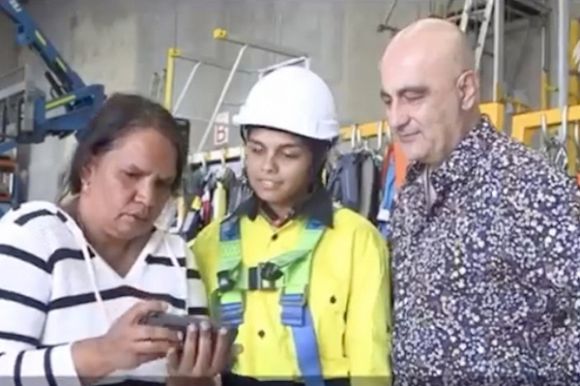By Megan Krakouer | 2 October 2020

Indigenous people living below the poverty line suffer even more without a financial safety net (Screenshot via YouTube)
Working at the coalface with the poorest, Megan Krakouer argues the importance of a minimum living wage for everyone.
A UNIVERSAL WAGE, even for the unemployed, is not only fundamental to a just society but it is in society’s best interests, including fiscally. We can reduce the number of Australians incarcerated, we can reduce the horrific numbers of my First Nations people incarcerated. We can reduce the suicide toll and reduce domestic violence.
Not only must there be a greater increase to Centrelink support payments, but there must also be a living wage that makes life for all Australians dignified. Crime will decrease — this is a no-brainer.
I work only for people living below the Henderson Poverty Line and therefore I work at the coalface of the grimmest settings.
Recently, Centrelink confirmed to us that here at the National Suicide Prevention & Trauma Recovery Project (NSPTRP), we are the lead agency in Western Australia in the last year – September 2019 to August 2020 – to have supported more First Nations Western Australians through Centrelink’s Indigenous Services Unit.
The NSPTRP has logged more than 1,000 support payment assists in that year-long period to my First Nations brothers and sisters and already more than 100 in the few weeks since. According to Centrelink, this is more than ten times any other service. We have also assisted non-Indigenous Western Australians.

Australia's invisible Indigenous left behind
Megan Krakouer promises to hold governments and institutions to account as a vital suicide prevention program remains unfunded.
In the last year, we have assisted more than 10,000 individuals across the nation. Eighty per cent have been First Nations, but we also have many migrant-born and other Australians walk through our doors or call us. We know what poverty looks like. I walk into the homes of our most vulnerable and we support those without a home, the street-present, those who sleep in cars or wherever they can.
Gerry Georgatos, national co-ordinator of NSPTRP, said:
“It is indisputable, support payments, the only means of income for the majority of our most vulnerable, are often encumbered by reporting requirements and interruptions to payments hit far too many.”
In fact, on average each month, hundreds of my First Nations people in Western Australia have their support payments stopped. For the poorest, with little light on the horizon, they often feel broken, kicked in the gut and do not have the will to look for support. Many will finish in a police lockup or gaol. Many will meltdown. Many will leave behind their families.
Gerry Georgatos said:
We support many individuals fleeing domestic violence, many with relationship breakdown and who have taken full care of the children, many leaving juvenile detention and prison without their support payments arranged.
It is a long-established fact and also identified by the Productivity Commission that the two most risk-riddled stressors are housing security and support payment interruptions.
Someone leaving prison without support payments arranged is at elevated risk of offending, at elevated risk of finishing up homeless. A family where support payments have been interrupted are at risk of negative aberrance, displaced anger and domestic violence. The lowest quintile of income comprises the most significant proportion of suicidality and therefore, to be without any income dramatically escalates risk.

Dickensian Australia — homeless orphans and ten-year-old children gaoled
Instead of offering assistance, our political system is one that would sooner incarcerate children in desperate need.
There is not a day that goes by without a support payment assist. Our service assists both First Nations and the non-Indigenous. We work only with people living in proximity to and below the poverty line. My First Nations people are dramatically disproportionally impacted by poverty. I know that assisting with support payments can save a life.
I have had highly stressed and agitated individuals, families with children in tow, leave a Centrelink queue after the restlessness of their children and visit our offices so we can sort their payments while the children are busied by colleagues.
Centrelink’s Indigenous Services Unit is a huge affirmative action for my First Nations People. I am surprised that our small national service, with only several personnel in Western Australia, is the lead agency in the support payment assists. In fact, it is only three of us out of the Western Australia office who do the support assists — myself, Gerry Georgatos and his daughter, who is our invaluable support admin, Connie Georgatos. I encourage other social services to utilise Centrelink’s Indigenous Services Unit so together we can meet needs.
The Indigenous Services Unit is of such high calibre that without fail, for every single individual we have sought assistance we had a same-day outcome. This is a vital validation to those in need and of an immediate significant reduction of what in the end is preventable distress.
To incarcerate a youth in juvenile detention on an annual basis costs $300,000. To incarcerate an adult on an annual basis costs $200,000. Support payments on a per person basis annually are less than $30,000. To lose someone to suicide because of their poverty comes at a greater cost than money alone can describe.
We should be doing everything we can to address support payment interruption, to ensure that everybody has that safety net at all times. We should ramp up the calls for a significant universal living wage. In one of the nation’s richest economies, we should leave no one behind.
Megan Krakouer LLB is a Mineng Noongar woman from Mt Barker in Western Australia’s southwest. Presently, Megan is the Director of the National Suicide Prevention & Trauma Recovery Project and also works as a human rights legal practitioner for the National Justice Project.
No comments:
Post a Comment